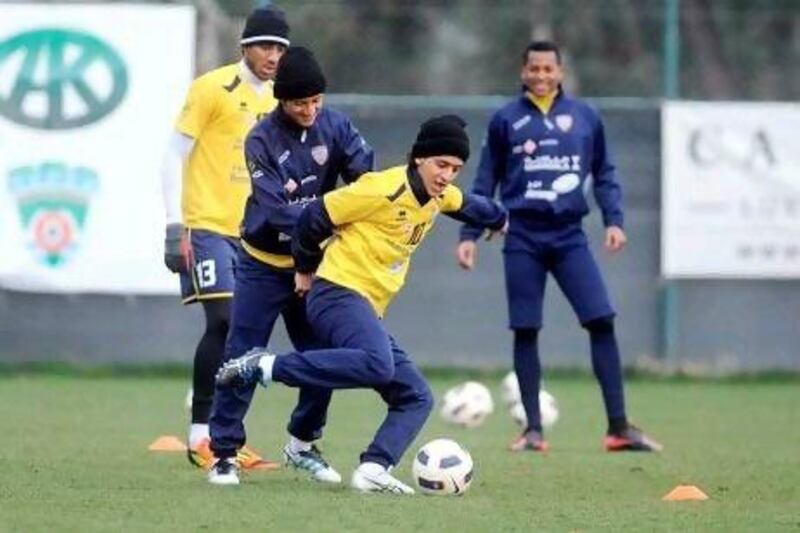DUBAI // The UAE athletes at the London Olympics will have a special team of dieticians on hand when they compete against the world's best during the Holy Month of Ramadan.
The Muslim period of fasting is expected to start on July 20, while the Games begin seven days later. The UAE is expecting its biggest contingent yet at an Olympics, and the football team will be a part of that, having confirmed their appearance with a thrilling 3-2 win over Uzbekistan in Tashkent on Wednesday night.
Mahdi Ali, the Olympic team coach, said: "It will be Ramadan during the Olympics, and we will have to plan carefully for this."
Officials of the National Olympic Committee (NOC) have already made plans for the athletes at the Games and Mohammed Al Kamali, the secretary general of the NOC, revealed they have employed a team of dieticians.
"We have hired a special team, which will support out athletes on the food side during Ramadan," Al Kamali said. "We have made all the arrangements - the type of food and drinks the athletes will have. The days will be really long, so we have to take good care of our athletes."
Al Kamali said the team will also make sure the athletes do not miss the delicacies they usually have at home during Ramadan.
"In Ramadan, we are used to a certain type of food," he said. "So we have hired a special team of dieticians, who will be able to offer our local Ramadan delicacies on the menu.
"We want our athletes to enjoy the kind of food they usually do in Ramadan, but we also want to make sure the food is right for them as regards calories and all those things. So all this has already been arranged. We did our homework a long time back."
As Muslims, the UAE athletes, including the football players, are used to competing during Ramadan. But at home, they usually play or train for a few hours after breaking their fasts at dusk. That might not be the case in London, given the long summer days with the sun setting as late as 9.30pm.
For that reason, requesting the International Olympic Committee to schedule their football matches after dusk is also not a possibility.
"It is really difficult because if we are talking about the time of breaking fast, it would be around 9.35pm," Al Kamali said.
"The problem is, it is a really long day. It's not that we will break fast at 4pm and so we can request to play our matches at 5pm.
"There are a lot of teams, media and everything, so changing schedules is not possible."
Keeping those challenges in mind, the UAE Football Association is hoping to draw up a plan that will help their team produce the best possible results at their maiden appearance at an Olympics.
"We know we are going to play in very difficult conditions as Muslims during Ramadan," said Yousuf Abdullah, the secretary general of the UAE Football Association. "So we will take care of all these things.
"The coach will make all the plans keeping the conditions in mind: Ramadan, the weather, the timings and everything.
"We will be taking all these elements in our planning and preparations.
"We will be playing against the top professionals from around the world, many of them superstars. So we will have to work really hard in the coming five months and prepare in the best possible way to get good results in the competition."
The football fraternity has no concerns about the players competing against the world's best while fasting.
"We are a Muslim country and we know how to play in Ramadan," said Fahad Ali, a former administrative manager of the national team and an ex Al Ain striker. "Before the 2009 Youth World Cup, the same players were in camp in Turkey during Ramadan.
"So they have experienced all these things over the last five or six years, playing together as a team. I believe Ramadan will be like a motivation for them."
Ali Bujsaim, an international football referee who has officiated at three World Cups, also believes fasting will not be a problem for the team.
"For me, I believe Ramadan is an advantage," he said.
"I have refereed some very important matches during Ramadan, while fasting, not in my country, but outside where you are not so well prepared. In my country, I am better prepared for Ramadan.
"I have refereed in Ghana, in Uruguay in Ramadan and those were some of the best matches of my life.
"So I don't think Ramadan will affect our players."
[ @ For more on OLYMPICS 2012 visit thenational.ae/topics ]





